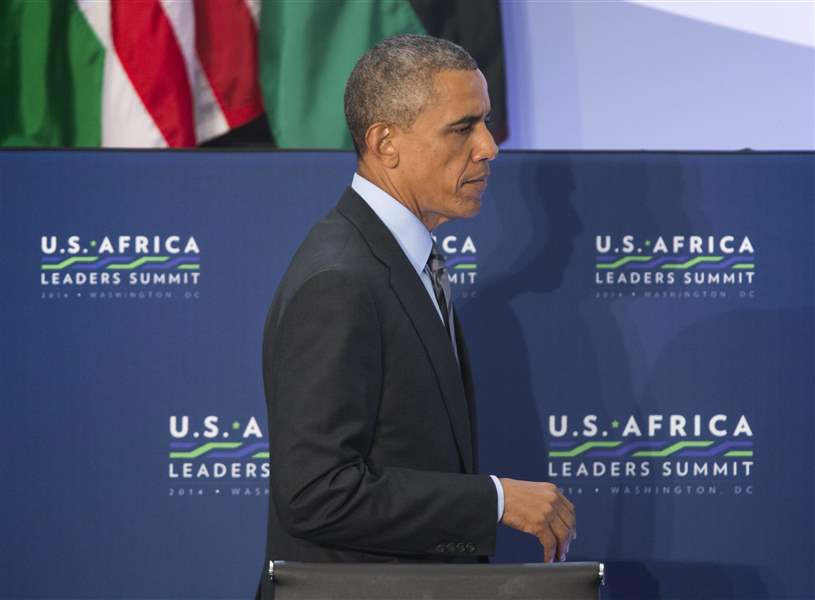
As summit closes, Obama hails US-Africa ties
8/6/2014
President Barack Obama arrives for the third Session of US African Leaders Summit, Wednesday, Aug. 6, 2014, at the State Department in Washington. President Barack Obama and dozens of African leaders opened talks Wednesday on two key issues that threaten to disrupt economic progress on the continent: security and government corruption. (AP Photo/Pablo Martinez Monsivais)
ASSOCIATED PRESS
WASHINGTON — The United States can play a key role in empowering an Africa that is increasingly prosperous despite the continent’s deep and persistent challenges, President Barack Obama said today as an unprecedented summit aimed in part at fostering Obama’s own African legacy came to an end.
Hailing the three-day conference in Washington as a major success, Obama touted the roughly $37 billion in investments that were spurred by the summit. He said the U.S. and African nations would work to make the gathering of leaders a recurring event. More than 50 African heads of state and government were in Washington for the talks.
“Africa must know that they will always have a strong and reliable partner in the United States of America,” Obama said at a news conference marking the end of the first U.S.-Africa Leaders Summit.
The president defended U.S. engagement with countries that have problematic records on human rights and corruption, arguing that America’s involvement can help spur those nations to do better. He said universal rights, good governance and the strengthening of civil societies were high priorities for the U.S. as it seeks to partner with Africa in the 21st century.
“We find that in some cases, engaging a country that generally is a good partner but is not performing optimally when it comes to all the various categories of human rights, that we can be effective in working with them on certain areas and criticizing them and trying to elicit improvements in other areas,” Obama said.
Among the leaders treated to an elaborate reception the night before at the White House were figures such as Kenyan President Uhuru Kenyatta, who has pleaded innocent regarding his alleged role in organizing violence that left more than 1,000 people dead. Obama has also spoken out repeatedly against recent laws passed in some African countries targeting lesbians and gays.
Those concerns took on a lower profile during the three days of meetings and festivities in Washington, where Obama sought to cast a spotlight on how the U.S. is shifting its support for Africa away from humanitarian aid and toward equal economic partnerships. Already, U.S. programs are working to bring electricity to 60 million African homes and businesses, lift 50 million people out of poverty and double the number of children infected with HIV who are taking anti-retroviral drugs, Obama said.
While the world is witnessing the emergence of a new, more prosperous Africa, expanded security cooperation is needed to address threats from terrorism and human trafficking that transcend the African continent, Obama said, alluding to U.S. concerns that extremism in north Africa and the Sahel could destabilize the already volatile region.
“The entire world has a stake in peacekeeping in Africa,” Obama said.
Earlier in the day, he called on African nations to be forceful in tackling the health, security and government corruption problems that could stunt economic progress on the continent.
The summit also marked a rare return to Washington for former President George W. Bush, who launched a $15 billion HIV/AIDS initiative while in office and has made public health issues in Africa a priority since leaving the White House. While Obama has continued Bush’s signature AIDS program, he has also been seeking his own legacy-building Africa initiatives. This week’s summit was seen as a cornerstone of that effort.